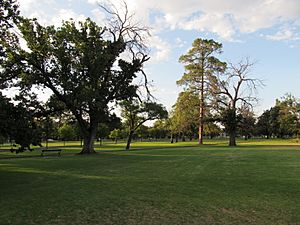Wellington Square, North Adelaide facts for kids
Quick facts for kids Wellington Square |
|
|---|---|
| Kudnartu | |
 |
|
| Lua error in Module:Location_map at line 420: attempt to index field 'wikibase' (a nil value). | |
| Type | Square |
| Location | North Adelaide, South Australia |
| Created | 1837 |
Wellington Square, also known as Kudnartu, is a public park in North Adelaide, South Australia. It is located in the middle of the largest part of North Adelaide. This square is one of six public spaces planned by Colonel William Light in his 1837 design for Adelaide and North Adelaide.
The square was first named in 1837 after the Duke of Wellington. Later, in 2003, it was given a second name, Kudnartu, in the Kaurna language. This was part of a project by the Adelaide City Council to use both English and Kaurna names. Kudnartu was an important Kaurna woman from the Clare area. Her marriage was the first official marriage between an Aboriginal person and a European settler in South Australia.
Contents
History of Wellington Square
Before Europeans Arrived
Long before European settlers came to Adelaide in 1836, the area was home to the Kaurna people. They were one of the local tribes living there.
How it Got its First Name
Wellington Square was named on May 23, 1837. It was named after Arthur Wellesley, 1st Duke of Wellington. He was a famous military leader and politician from Ireland. He won a very important battle called the Battle of Waterloo. He also served as the Prime Minister of the United Kingdom from 1828 to 1830. The Duke of Wellington helped pass a law in 1834 that led to the founding of South Australia. Colonel Light, who designed Adelaide, had briefly worked under the Duke of Wellington during a war.
Getting a Second Name: Kudnartu
In March 2003, the square received a second name, "Kudnartu." This was part of a project by the City of Adelaide and the University of Adelaide to honor the original Kaurna people. Kudnartu was a Kaurna woman from the Clare District. In January 1848, she married a settler named Tom Adams. This was the first official marriage between an Aboriginal person and a settler recorded in South Australia.
Kudnartu also went by the name Mary Ann Adams. She had learned household skills at a special school. She even taught her husband, Tom Adams, how to write. They had two sons, Tom (born 1849) and Tim (born 1852). After Kudnartu passed away around 1855, her family faced challenges, especially when the land meant for her was taken back by the government. Kudnartu's family still has descendants living today.
Wellington Square Today
Wellington Square is one of only two of Colonel Light's original six squares that still look much like they did in the beginning. Unlike some other squares, it has not been cut through by roads. The square is home to beautiful jacaranda trees, roses, and cherry trees. There is a walking path around the edge of the square that is about 700 meters (765 yards) long.
 | Laphonza Butler |
 | Daisy Bates |
 | Elizabeth Piper Ensley |

